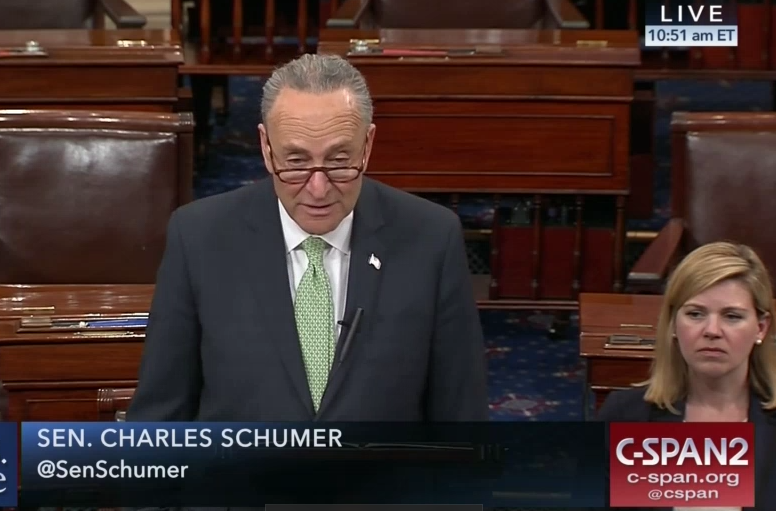Schumer: Consumers May Need Internet Affordability Protections
The smarter way to stay on top of the multichannel video marketplace. Sign up below.
You are now subscribed
Your newsletter sign-up was successful
Senate Democratic leader Chuck Schumer (D-N.Y.), said the internet is a necessity and the government may not be able to let providers charge whatever they want for the use of what is an essential service, like a utility or road.
That came in his floor argument for a Congressional Review Act resolution that would nullify the FCC's reclassification of ISPs out from under the Title II, utlility-style regulatory regime that allows for rate regulation, either before or after the fact.
Related: Sen. Thune Backs Prohibiting Paid Prioritization
FCC chair Tom Wheeler made forbearing from rate regulation one of the elements of the 2015 Open Internet Order, but Schumer talked, in the context of not allowing paid prioritization at least, about internet access as an essential good whose price the government may need to insure is kept within reach of "average folks," though he did not say what specific mechanisms should be used to insure affordability.
Democrats generally argue that broadband access is about price as well as available plant, But Schumer's evocation of it in the context of returning to a Title II regime set off some alarm bells with those who have argued that Title II was a potential path to rate regulation and it would not be hard to un-forbear from rate regs if a new FCC or Congress wanted to do so.
That was the concern that led Republican FCC Commissioner Michael O'Rielly to label Wheeler's approach "fauxbearance."
Related: Rate Regulation By Any Other Name
The smarter way to stay on top of the multichannel video marketplace. Sign up below.
"Public schools, rural Americans, communities of color or anyone in a remote area or without substantial resources could be at a significant disadvantage if the ISPs start charging more for decent internet," Schumer said.

"You know, people say, well, let a private company do whatever it wants, let them charge whatever they want," he continued. "But in certain goods which are essential we don't do that. Utilities, highways. The same thing now applies to the internet. It's a necessity and we have to have protections for average folks, for small businesses, for working families."
He said that concern is behind Democrats' effort to restore the old rules against blocking, throttling and paid prioritization.
His vision is of an internet "free and open like our highways, accessible and affordable to every American, regardless of your ability to pay."
There are already programs to subsidize broadband to low income residents, including billions of dollars in Universal Service funds, billions of dollars already spent on stimulus fund broadband buildout efforts, and ISP programs to get affordable broadband to families with school-age children, he said.
But Democrats and Republicans agree that more needs to be done to close the digital divide and get more folks online, both by reaching more homes and making it more affordable to the underprivileged and more attractive to those who have yet to go online for reasons other than availability or price.
Schumer signaled he is not looking to hand out free internet, but that there was a public interest in making sure that good service was affordable.
"It's not that you don't pay, it's that if you're a little guy or gal you shouldn't pay a lot more than the big shots," he said. "We don't do that on highways, we don't do that with utilities and we shouldn't do it with the internet, another modern 21st century highway that is a necessity."
Schumer urged his listeners to "call, write, or visit" their senator or House member. "Your wallets and well-being, in ways far more significant than most things we do here, depend on it," he said.
“Tom Wheeler always claimed that the Title II public utility regulatory regime was not put in place to regulate the rates of ISPs," said Free State President Randolph May in response to Shcumer's floor speech. "This was not entirely true even then, for example, witness his investigation of zero-rated or free data plans. No surprise after all, because the regulation of rates is at the very core of Title II. You need go no further than Sections 201 and 202! But now Senator Schumer has let the cat out of the bag in a display, at least, of unusual candor. He is arguing for reimposing Title II regulation explicitly on the basis that it can be used to regulate ISPs’ rates to end user customers."This should certainly help clarify the ongoing ‘net neutrality’ debate — on the one side you have those who make no bones about wanting to regulate Internet providers like Ma Bell was regulated. On the other you have those, like me, who want to employ light touch regulation appropriate for service providers in a dynamic, increasingly competitive market. The future is with my side."
Contributing editor John Eggerton has been an editor and/or writer on media regulation, legislation and policy for over four decades, including covering the FCC, FTC, Congress, the major media trade associations, and the federal courts. In addition to Multichannel News and Broadcasting + Cable, his work has appeared in Radio World, TV Technology, TV Fax, This Week in Consumer Electronics, Variety and the Encyclopedia Britannica.

